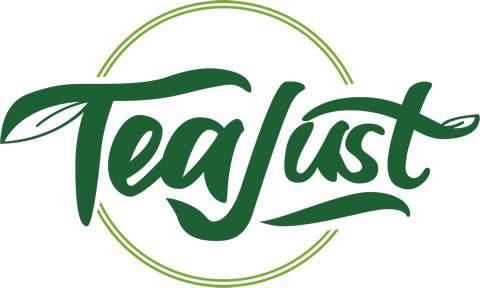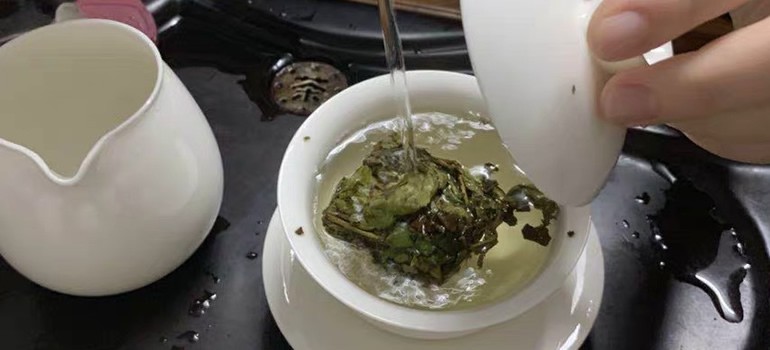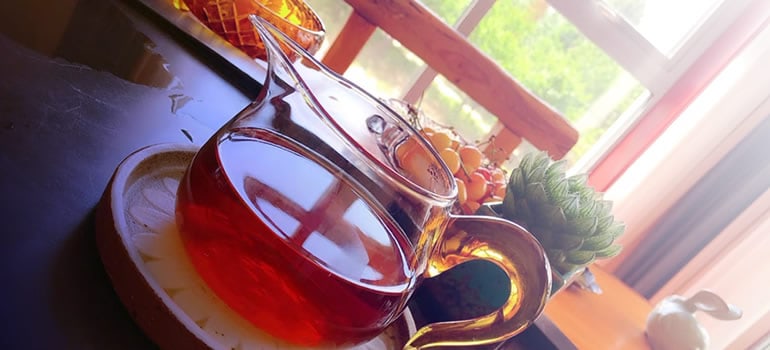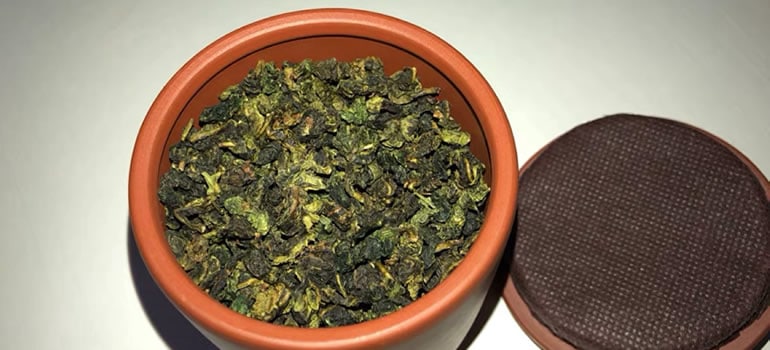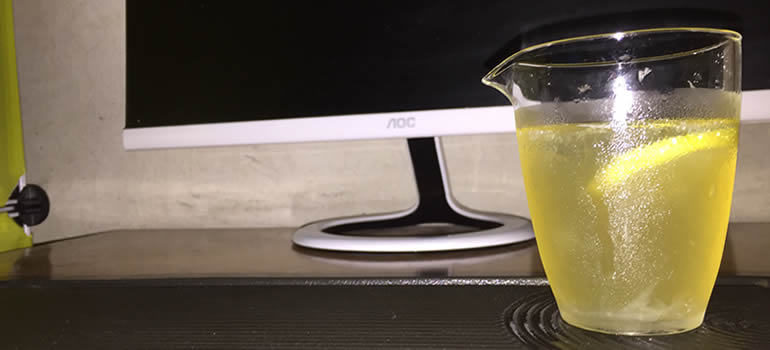Many of us do like drinking tea on a regular basis. It contains healthy nutrients, and it tastes great.
Going raw vegan often is a part of the natural way the vegan lifestyle develops with time. But it may not seem like an easy jump to make.
Especially in the beginning. There are some rules and recommendations we need to follow so this begs the question…
Can raw vegans drink tea? Tea is not necessarily forbidden to a raw vegan. However, most of the teas are not recommended as they do not meet the principles of the raw vegan diet. Some teas, do contain high amounts of caffeine and are produced by heating the leaves at very high temperatures. Both are things that are not permitted on a vegan diet.
Most of the people that start a raw vegan diet have individual goals in mind.
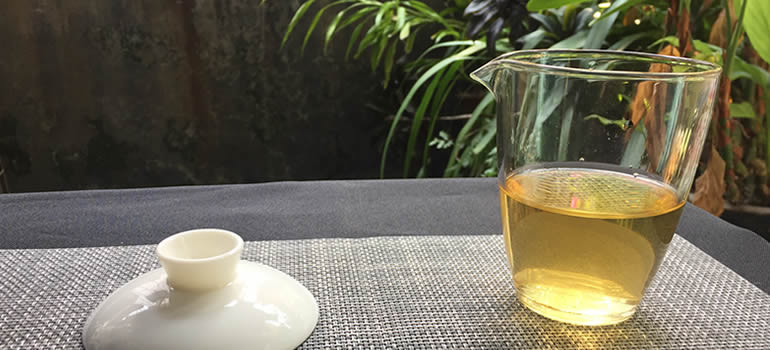
They may want to live a more healthy lifestyle. They may want to detox their body of all the toxins that may have accumulated from the Standard American Diet. They may also want to live a more wholesome and pure life that is closer to nature, and that will not harm any other lives in the process.
Or their goal may very well be all of these at the same time.
So let’s take a more in-depth look at what we need to know about raw veganism and how we can adapt our tea choices to it.
What Raw Vegans Eat and Drink
Let’s first take a brief look at what raw vegans can eat and drink. After that, we will see how all this stacks up to tea drinking, and what we need to know about it.
1. The Food Raw Vegans Eat
The food that raw vegans eat has to adhere to a few principles.
The food has to be vegan (of course) – so no dairy, eggs, meat or other animal foods – and it should either be eaten in its fully raw state or heated at very low temperatures not going above 104 – 115 Fahrenheit (or 40 – 46 Celsius).
It is believed that a raw vegan diet promotes better overall health, more energy, better-looking skin, and weight loss. It is also believed that by cooking the food at a high-temperature level, a lot of the beneficial minerals, vitamins, and the nutritional density of the food is lost.
The raw vegan diet will consist of mostly whole and unprocessed foods like:
- Organic vegetables, fruits, and nuts.
- Sprouted grains and legumes.
- Raw organic seeds.
- Seaweed.
- Healthy fats and oils, and more.
2. The Drinks Raw Vegans Drink
As we can see a raw vegan diet may seem like a very strict and restrictive; however, there are a lot of different types of products that we have access to in the modern days.
So let’s take a look at how it stacks up when it comes to drinks and beverages?
Raw vegans usually drink:
- Purified water.
- Fresh fruit juices.
- Vegetable juices.
- Raw nut milk.
- Coconut water.
- Wheatgrass (and barley grass) juices, and more.
This can also include herbal teas. But there is a little caveat here. First, we have to explore what foods and drinks are a no-no on a raw vegan diet.
3. What Foods and Drinks Should NOT Be Eaten on a Raw Vegan Diet
As we have discussed the first thing to avoid is heating and cooking the food above 114 F.
Other things that raw vegans avoid are:
- Refined and processed foods.
- Foods that are not organic or that have been treated with pesticides.
- Pasteurized foods.
- Caffeine.
As you can see, caffeine is not allowed on a raw vegan diet.
On the one hand, this is immediately eliminating coffee from the raw vegan’s shopping list. On the other hand, this will also eliminate some tea types like black and green tea, as well.
Are All Kinds of Tea Not Permitted on a Raw Vegan Diet?
Not all tea is created equal.
If we consider the standard vegan diet, most teas are considered okay — teas like black, green, oolong, citrus teas, herbal teas, earl gray, etc.
Another point I would like to make is that any of the processed teas are usually not vegan-friendly.
Some flavored teas are not vegan at all (caramel flavored tea, for example).
Sometimes we may easily overlook that certain ingredients and additives that we can put in our tea are also not vegan like milk, creamers, honey, sugar, etc.
In its essence tea is comprised of leaves and water – or leaf water if you will. These leaves can come from various plants, bushes, flowers, etc. There is nothing inherently wrong with them, and they are good to go for any vegan.
It’s healthy, it’s green, it’s super delicious – what more can you really want?
Well, not so fast.
1. What Teas Are Not Suitable for a Raw Vegan Diet?
As I pointed out earlier in this article, tea needs to comply with specific details in order to be considered okay for consumption on a raw vegan diet.
It should not have gone through high temperatures, no additional processing. It should be free of pesticides and caffeine.
These things will definitely rule out a lot of the different kinds of tea.
For example, black tea, green tea, white tea, and oolong all have caffeine in varying amounts in them. Many different tea blends do contain black tea in them as a base, so they are also a no go (like earl grey, for example).
2. How Tea Is Dried?
Another point of concern is how tea is made. During its processing, it goes through many different steps. One of which is drying.
Drying the tea leaves can be done in several ways, including baking. This may not comply with the general rule to not eat food that has been heated above 114 F.
However, certain teas leaves are sun-dried, which can be considered okay for a raw vegan diet.
3. Is Herbal Tea Good?
Herbal tea generally contains different leaves, seeds, dried flowers and fruits like chamomile (my personal favorite), peppermint, ginger, hibiscus, rooibos, hibiscus, and more.
This is making herbal tea caffeine-free and generally speaking the ideal choice for a raw vegan as long as it hasn’t gone through any high-temperature drying.
So Why Is Caffeine Bad?
Caffeine may not necessarily be bad in general.
However, veganism is a lot more than just a diet it is a lifestyle, or a philosophy if you will. The idea that is held is that veganism values life – the life of both animals and humans. And it aims to reduce not just the cruelty to all living beings as much as possible but also our carbon footprint.
So it really depends on how serious you go about it. If you are a vegan, then caffeine – found in coffee and tea – may not necessarily be something to frown about.
But a raw vegan diet is one level above that.
One of the first things that are eliminated from a raw vegan diet is coffee. The reason is it is roasted at higher temperatures.
But what happens with tea leaves and the caffeine content in them?
Why are they often forbidden?
In certain areas, many raw vegans would consider caffeine to be a stimulant (quite similar to how sugar is regarded as the same). And being such it is best avoided.
Another aspect of caffeine is that it may be considered a toxin in some cases, essentially ruining your goal to cleanse and detox.
Should You Completely Cut out Tea When Going Raw Vegan?
This may be a confusing topic for a lot of the people that are new to raw veganism.
However, as I pointed out, not all tea (and coffee) is created equal.
There is one thing you need to consider. How much caffeine have you been consuming up until now?
Since caffeine is such a powerful stimulant, it has been shown that we can get addicted to it to a certain degree.
Caffeine is not a drug but can have similar effects on us. What I mean is that if your body is used to receiving a lot of caffeine through your daily tea consumption, and suddenly you stop drinking tea – you will experience withdrawal symptoms.
In that case, it is best to take a more slow and gradual approach. Start by reducing gradually step by step your tea consumption.
